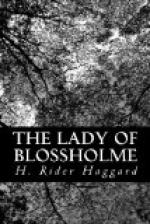“Then do so, Jeffrey, if you are scared, and I will go on alone, who, being on an honest business, fear not Satan or an abbot, either.”
“Nay, master. Many a year ago, when we were younger, I stood by you on Flodden Field when Sir Edward, Christopher Harflete’s father, was killed at our side, and those red-bearded Scotch bare-breeks pressed us hard, yet I never itched to turn my back, even after that great fellow with an axe got you down, and we thought that all was lost. Then shall I do so now?—though it is true that I fear yon goblin more than all the Highlanders beyond the Tweed. Ride on; man can die but once, and for my part I care not when it comes, who have little to lose in an ill world.”
So without more words they started forward, peering about them as they went. Soon the forest thickened, and the track they followed wound its way round great trunks of primeval oaks, or the edges of bog-holes, or through brakes of thorns. Hard enough it was to find it at times, since the snow made it one with the bordering ground, and the gloom of the oaks was great. But Jeffrey was a woodman born, and from his childhood had known the shape of every tree in that waste, so that they held safely to their road. Well would it have been for them if they had not!
They came to a place where three other tracks crossed that which they rode upon, and here Jeffrey Stokes, who was ahead, held up his hand.
“What is it?” asked Sir John.
“It is the marks of ten or a dozen shod horses passed within two hours, since the last snow fell. And who be they, I wonder?”
“Doubtless travellers like ourselves. Ride on, man; that farm is not a mile ahead.”
Then Jeffrey broke out.
“Master, I like it not,” he said. “Battle-horses have gone by here, not chapmen’s or farmers’ nags, and I think I know their breed. I say that we had best turn about if we would not walk into some snare.”
“Turn you, then,” grumbled Sir John indifferently. “I am cold and weary, and seek my rest.”
“Pray God that you may not find it when you are colder,” muttered Jeffrey, spurring his horse.
They went on through the dead winter silence, that was broken only by the hoots of a flitting owl hungry for the food that it could not find, and the swish of the feet of a galloping fox as it looped past them through the snow. Presently they came to an open place ringed in by forest, so wet that only marsh-trees would grow there. To their right lay a little ice-covered mere, with sere, brown reeds standing here and there upon its face, and at the end of it a group of stark pollarded willows, whereof the tops had been cut for poles by those who dwelt in the forest farm near by. Sir John looked at the place and shivered a little—perhaps because the frost bit him. Or was it that he remembered his daughter’s dream, which told of such a spot? At any rate, he set his teeth, and his right hand sought the hilt of his sword. His weary horse sniffed the air and neighed, and the neigh was answered from close at hand.




